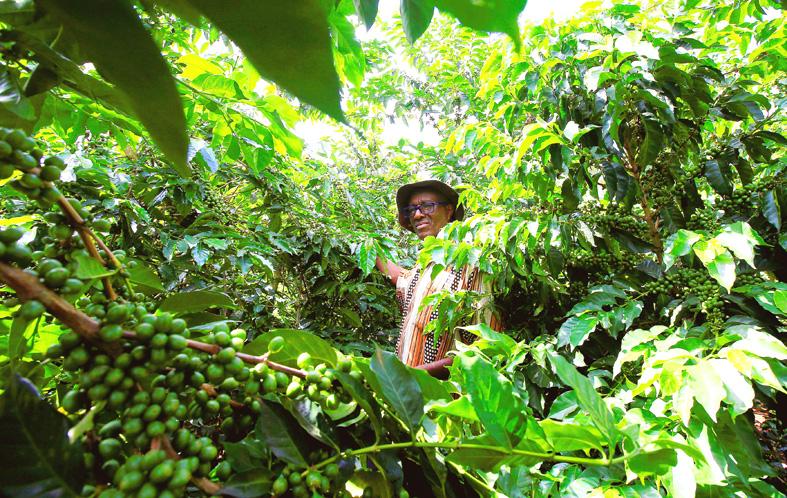Coffee producers from Central America and Indonesia dominated the Taiwan International Coffee Show at the Taipei Nangang Exhibition Center yesterday, sending a strong message that small-scale farmers and their families rely on sustainable supply chains.
“For every five US dollars some big brands make, the farmer only gets one cent. As you can imagine, it’s an unfair game,” Zircle Coffee founder and CEO Elias Rivera told the Central News Agency.
His company promotes sustainable supply chains in his home country of Honduras, working with small farmers and buying coffee beans at a 10 to 20 percent premium compared with market prices, Rivera said.

Photo: Reuters
Zircle Coffee buys at higher prices because he has seen big coffee brands and intermediaries take advantage of smaller farmers, who are vulnerable due to limited access to information on the market value of their product, Rivera said.
“We are trying to form long-term relationships with the farmers. They are the most important people, but actually they are the ones who get the least,” he said.
Rivera was not the only industry representative among the 230 exhibitors across 820 booths who promoted a farmer-centric approach at the 19th edition of the annual show, which opened on Friday and ends today.
Guatemalan coffee importer Alvaro Lopez from JAK International Trade Co said that one of the bigger farms he works with supports four schools, two hospitals and an apartment complex where its workers can live rent-free.
Programs that give farmers’ children access to free basic education and scholarships for higher education are meaningful because it means that kids would not spend their childhood working on farms, he said.
“Sometimes kids prefer to help their parents’ farm so they will earn more profits, but we prefer the kids to go to school and learn skills. If the kids later want to become farmers, that is great, but at least they have tools to improve their lives,” Lopez said.
JAK also buys from family farms that would otherwise have no access to the international market, he said.
“It is very important to have that relationship with the person who is actually in the farm instead of the businessman who is in the office and might not even know how the coffee is actually processed,” Lopez said.
Taiwanese Aimee Chan (詹雅雯), a manager at EOE Indonesia, said that the firm works with local farmers who produce kopi luwak — an Indonesian specialty coffee from beans partly digested by Asian palm civets — to help the producers empower themselves.
The company also promotes collecting beans from droppings of wild civets instead of caging the animals, Chan said.
“I love animals ... and when we opened EOE Indonesia, the one thing we wanted to do was preserve the environment, and caging the luwak is not part of that,” EOE founder Peter Masyuni said during a visit to Taiwan last year, referring to the civets by their Indonesian name.
The Taiwan International Coffee Show is one of the Asia-Pacific region’s largest coffee fair, attracting up to 200,000 visitors every year.

Shares in Taiwan closed at a new high yesterday, the first trading day of the new year, as contract chipmaker Taiwan Semiconductor Manufacturing Co (TSMC, 台積電) continued to break records amid an artificial intelligence (AI) boom, dealers said. The TAIEX closed up 386.21 points, or 1.33 percent, at 29,349.81, with turnover totaling NT$648.844 billion (US$20.65 billion). “Judging from a stronger Taiwan dollar against the US dollar, I think foreign institutional investors returned from the holidays and brought funds into the local market,” Concord Securities Co (康和證券) analyst Kerry Huang (黃志祺) said. “Foreign investors just rebuilt their positions with TSMC as their top target,

REVENUE PERFORMANCE: Cloud and network products, and electronic components saw strong increases, while smart consumer electronics and computing products fell Hon Hai Precision Industry Co (鴻海精密) yesterday posted 26.51 percent quarterly growth in revenue for last quarter to NT$2.6 trillion (US$82.44 billion), the strongest on record for the period and above expectations, but the company forecast a slight revenue dip this quarter due to seasonal factors. On an annual basis, revenue last quarter grew 22.07 percent, the company said. Analysts on average estimated about NT$2.4 trillion increase. Hon Hai, which assembles servers for Nvidia Corp and iPhones for Apple Inc, is expanding its capacity in the US, adding artificial intelligence (AI) server production in Wisconsin and Texas, where it operates established campuses. This

H200 CHIPS: A source said that Nvidia has asked the Taiwanese company to begin production of additional chips and work is expected to start in the second quarter Nvidia Corp is scrambling to meet demand for its H200 artificial intelligence (AI) chips from Chinese technology companies and has approached contract manufacturer Taiwan Semiconductor Manufacturing Co (TSMC, 台積電) to ramp up production, sources said. Chinese technology companies have placed orders for more than 2 million H200 chips for this year, while Nvidia holds just 700,000 units in stock, two of the people said. The exact additional volume Nvidia intends to order from TSMC remains unclear, they said. A third source said that Nvidia has asked TSMC to begin production of the additional chips and work is expected to start in the second

US President Donald Trump on Friday blocked US photonics firm HieFo Corp’s US$3 million acquisition of assets in New Jersey-based aerospace and defense specialist Emcore Corp, citing national security and China-related concerns. In an order released by the White House, Trump said HieFo was “controlled by a citizen of the People’s Republic of China” and that its 2024 acquisition of Emcore’s businesses led the US president to believe that it might “take action that threatens to impair the national security of the United States.” The order did not name the person or detail Trump’s concerns. “The Transaction is hereby prohibited,”